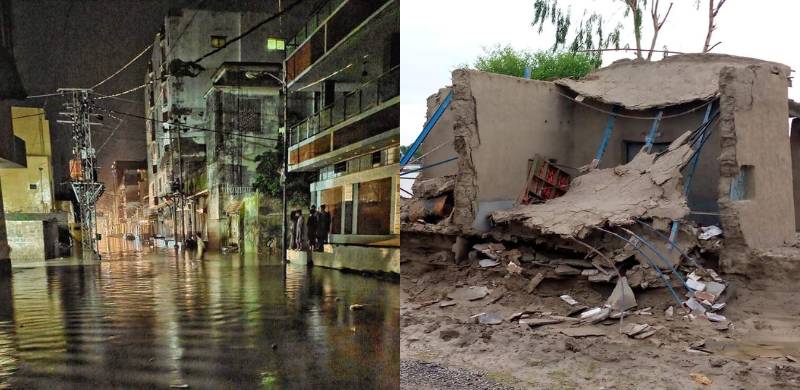
In Pakistan, monsoon season has always been somewhat temperamental, with the ferocity of the summer rain changing in mere seconds. In recent years, climate change has made the mood-swings of monsoon even worse. This year, heavy rainfall has wreaked havoc in many major cities of the country, but none have been hit harder than those in Balochistan. To make matters worse, mainstream media often neglects to bring attention to the province even during regular non-monsoon days, but to do so amid the current climate crisis means that Balochistan gets barely any attention as far as relief programs and donation drives go.
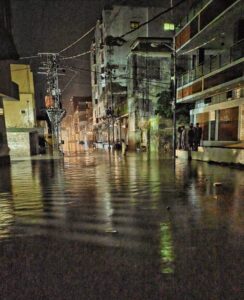
The situation is precarious: heavy consistent rainfall led to the breaching of ten dams in the province, out of which eight actively burst, resulting in the Balochistan government declaring a state of emergency. A little over ten days later, the death toll rose to 102, and schools, offices, fields and roads were flooded. Over 6,000 houses and 550 kilometers of a road track were destroyed. People were stranded with no way to escape. The flash flooding and continuous rainfall led to cellular and internet services being disrupted, and it was reported that 343 cell sites in the region were affected. In the course of a couple of weeks, an entire province was physically and technologically cut off from the rest of the country.
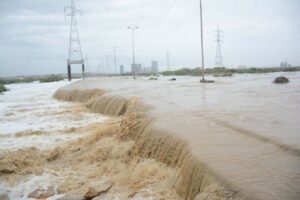
The worst hit areas lie within the Lasbela district which is the closest to the Hub Dam and borders Sindh. Naz Barakzai is the co-founder of the Raaji Baloch women's forum and lives in Uthal city in the Lasbela district. She tells The Friday Times that the most affected area in the region is near the water, and says that the areas of Lyari and Lakhra have still not been rescued. She says that many parts of north-west Balochistan, such as Kund Faqeer Goth, have not had any rescue operations. "This place is difficult to traverse even during normal times, and now access has been destroyed from 20 different places," she says.
Naz says even within Uthal there are so many areas that remain affected, such as Mochi Muhalla, Bacchal, Angara Goth and Sheebi Muhalla. She says there are many residents in dire need of shelter, even if it's something as basic as pitching up a tent, and says that many villages have been wiped clean. "God only knows if the residents have immigrated somewhere, or if the water has swept them away," she says.
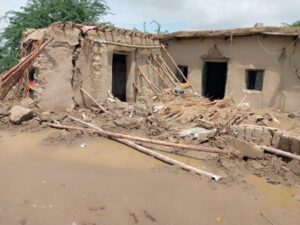
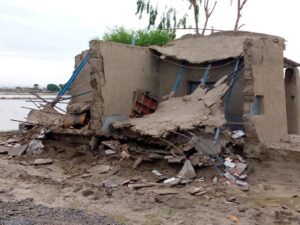
Naz confirms that internet and cellular services in the region are far and few between. "We just got to know from the district commissioner office that 10 kilometers east and west of Uthal and Bela, there are no mobile signals nor is there any internet connectivity," she tells TFT.
While there have been rescue operations, Naz says there haven't been that as many as needed. She says it's difficult to access the affected areas even with helicopters or boats, because in addition to being flooded, the surrounding area is extremely muddy and sinking in the mud is possible. "I got stuck in the mud up till my knees, and it affected me really badly," she said, adding that she had to be pulled out by force. "Even if the Army is providing rations, it is doing so from the air, which means they have to throw the rations down on the roofs of the houses," Naz says, explaining that this causes the ration bags to burst, contaminating its' contents, or it causes the roofs to further break down.
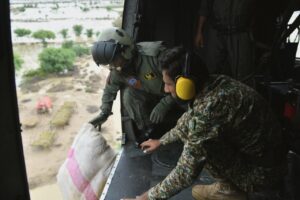
According to Naz, neither political parties, nor federal and provincial governments, including Balochistan's own, are conducting the sort of relief programs and rescue operations as required by the situation. She says there are almost 40 organizations currently working to provide relief to the flood-stricken areas, however, no one has easy access to a helicopter, therefore it is a matter of urgency that the roads be cleared as soon as possible. "The flooding started two weeks ago, but Lasbela has been experiencing heavy rainfall since July 5; if they can't even clear a road between then and now, who should we hold responsible?" she questions, explaining that relief work has been stuck because of a lack of road access. "This will lead to starvation and illness; already I'm seeing a spread of diseases like cholera and skin infections," she tells TFT.
https://twitter.com/YakjehtiKarachi/status/1554849022891868161
https://twitter.com/sikanderbizenjo/status/1552691671045148673
Although climate activist Granaz Baloch lives in a different part of Balochistan in the city of Turbat, she says the rains have been spreading chaos there too. The rainwater seeped into houses, causing people to have to move. She adds that the date crops have been adversely affected by the rains as well. Date crops are grown and harvested during the summer, and the cultivation of dates is a means of livelihood for many in the region. In fact, she tells TFT that many people specifically look for work on the date fields during the summer, because the income is higher. "This year, due to the rain and the humidity, date crops have been developing fungus and mold," she said, adding that there hasn't been much production of dates this summer, which means many people will be losing their source of income.
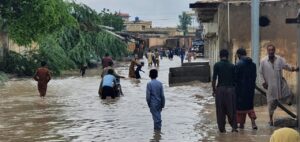
https://twitter.com/NSMagsiOfficial/status/1479050199741960198
Additionally, she said that when the Mirani Dam was constructed in 2006, local residents who lived in the area where the dam was constructed relocated to other places along the river in 2007. After relocation, they constructed unplanned houses without leaving ample space and pathways for natural water flow around nullahs, especially since it's all mountainous terrain . "This year, the exact same thing happened. People had constructed houses near the nullahs, and the water flowed down at such high pressures that it flooded their houses and fields," she says. The direction of the water overflow from the Mirani dam also puts local residents at risk. "This time, when the Lasbela crisis was going on, people from the district commissioner's office came by and asked everyone to evacuate because the water overflow could reach their villages and destroy their houses," she says. "But everyone was reluctant, questioning how they could leave their houses and their fields just like that, especially during the summer date harvest."

The situation is precarious: heavy consistent rainfall led to the breaching of ten dams in the province, out of which eight actively burst, resulting in the Balochistan government declaring a state of emergency. A little over ten days later, the death toll rose to 102, and schools, offices, fields and roads were flooded. Over 6,000 houses and 550 kilometers of a road track were destroyed. People were stranded with no way to escape. The flash flooding and continuous rainfall led to cellular and internet services being disrupted, and it was reported that 343 cell sites in the region were affected. In the course of a couple of weeks, an entire province was physically and technologically cut off from the rest of the country.

The worst hit areas lie within the Lasbela district which is the closest to the Hub Dam and borders Sindh. Naz Barakzai is the co-founder of the Raaji Baloch women's forum and lives in Uthal city in the Lasbela district. She tells The Friday Times that the most affected area in the region is near the water, and says that the areas of Lyari and Lakhra have still not been rescued. She says that many parts of north-west Balochistan, such as Kund Faqeer Goth, have not had any rescue operations. "This place is difficult to traverse even during normal times, and now access has been destroyed from 20 different places," she says.
Naz says even within Uthal there are so many areas that remain affected, such as Mochi Muhalla, Bacchal, Angara Goth and Sheebi Muhalla. She says there are many residents in dire need of shelter, even if it's something as basic as pitching up a tent, and says that many villages have been wiped clean. "God only knows if the residents have immigrated somewhere, or if the water has swept them away," she says.


Naz confirms that internet and cellular services in the region are far and few between. "We just got to know from the district commissioner office that 10 kilometers east and west of Uthal and Bela, there are no mobile signals nor is there any internet connectivity," she tells TFT.
While there have been rescue operations, Naz says there haven't been that as many as needed. She says it's difficult to access the affected areas even with helicopters or boats, because in addition to being flooded, the surrounding area is extremely muddy and sinking in the mud is possible. "I got stuck in the mud up till my knees, and it affected me really badly," she said, adding that she had to be pulled out by force. "Even if the Army is providing rations, it is doing so from the air, which means they have to throw the rations down on the roofs of the houses," Naz says, explaining that this causes the ration bags to burst, contaminating its' contents, or it causes the roofs to further break down.

According to Naz, neither political parties, nor federal and provincial governments, including Balochistan's own, are conducting the sort of relief programs and rescue operations as required by the situation. She says there are almost 40 organizations currently working to provide relief to the flood-stricken areas, however, no one has easy access to a helicopter, therefore it is a matter of urgency that the roads be cleared as soon as possible. "The flooding started two weeks ago, but Lasbela has been experiencing heavy rainfall since July 5; if they can't even clear a road between then and now, who should we hold responsible?" she questions, explaining that relief work has been stuck because of a lack of road access. "This will lead to starvation and illness; already I'm seeing a spread of diseases like cholera and skin infections," she tells TFT.
https://twitter.com/YakjehtiKarachi/status/1554849022891868161
https://twitter.com/sikanderbizenjo/status/1552691671045148673
Although climate activist Granaz Baloch lives in a different part of Balochistan in the city of Turbat, she says the rains have been spreading chaos there too. The rainwater seeped into houses, causing people to have to move. She adds that the date crops have been adversely affected by the rains as well. Date crops are grown and harvested during the summer, and the cultivation of dates is a means of livelihood for many in the region. In fact, she tells TFT that many people specifically look for work on the date fields during the summer, because the income is higher. "This year, due to the rain and the humidity, date crops have been developing fungus and mold," she said, adding that there hasn't been much production of dates this summer, which means many people will be losing their source of income.

https://twitter.com/NSMagsiOfficial/status/1479050199741960198
Additionally, she said that when the Mirani Dam was constructed in 2006, local residents who lived in the area where the dam was constructed relocated to other places along the river in 2007. After relocation, they constructed unplanned houses without leaving ample space and pathways for natural water flow around nullahs, especially since it's all mountainous terrain . "This year, the exact same thing happened. People had constructed houses near the nullahs, and the water flowed down at such high pressures that it flooded their houses and fields," she says. The direction of the water overflow from the Mirani dam also puts local residents at risk. "This time, when the Lasbela crisis was going on, people from the district commissioner's office came by and asked everyone to evacuate because the water overflow could reach their villages and destroy their houses," she says. "But everyone was reluctant, questioning how they could leave their houses and their fields just like that, especially during the summer date harvest."

